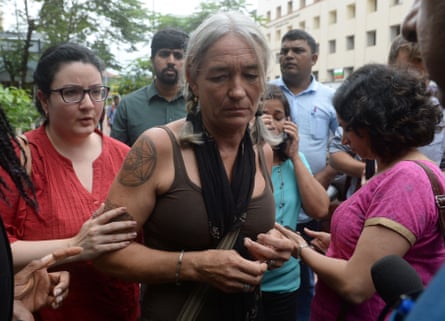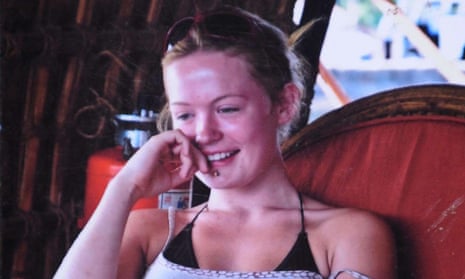A man has been convicted in relation to the death of 15-year-old Scarlett Keeling, more than 10 years after she was found dead on a beach in Goa.
Fiona MacKeown, Scarlett’s mother, said she was shocked but delighted. “It’s still a bit hard to take it in, that this might actually be the end of it all for us,” she said. “It has been traumatic for the children every time I’ve had to go to Goa, and for me, it’s put me into huge debt. It’s been an absolute nightmare for 11 years.”

At a hearing on Wednesday, the high court in Goa reversed an earlier acquittal to convict of Samson d’Souza of culpable homicide, criminal assault and outraging a woman’s modesty, providing narcotics to a person with knowledge that it could cause serious harm or death, and destruction of evidence. He was also convicted under the Goa children’s code for not providing a safe environment for a child, according to MacKeown’s lawyer, Vikram Varma.
It is expected that D’Souza will be sentenced on Friday or Saturday, when he could face decades in prison. A second man, Placido Carvalho, accused of abetting a crime, had his acquittal upheld.
Scarlett’s bruised and half-naked body was found on the popular Anjuna beach in the north of Goa after a Valentine’s Day beach party.
From the start, the police made no effort to properly investigate the case, said MacKeown. She remembers finding Scarlett’s underwear and broken sandals on the beach the day after her murder. “I knew the police had lied to me and not looked for any evidence – it was right there. I was so shocked, it made the ends of my fingers ache.”
Through chance, a woman whose son was friends with Scarlett put MacKeown in touch with Varma. They went from police station to police station on a moped, demanding that the case be treated as a murder investigation.
Police initially said Scarlett’s death was an accidental drowning, but MacKeown insisted on a second autopsy.
“They were saying it was an accident. I knew she hadn’t drowned accidentally,” she said. While Varma spoke to the pathologist who had carried out an autopsy, she sneaked in behind them and took photographs of Scarlett’s body “to prove that she had injuries on her because they were denying that”.
A later postmortem showed there was ecstasy, cocaine and LSD in the teenager’s body. It also revealed 50 cuts and bruises and evidence of sexual assault. It was alleged that D’Souza plied her with drugs, raped her and left her unconscious face down on the beach.
Following D’Souza’s acquittal in 2016 on charges of rape and culpable homicide at Goa children’s court, India’s Central Bureau of Investigation announced that it would appeal against the judgment, stating that the judge had not “applied her judicial mind both on points of law and on facts of the case”.
The CBI also said the judge had wrongly concluded that there was a delay in recording witness statements.
The investigation into Scarlett’s murder was fraught with setbacks including years of delays in India’s sluggish justice system, a change of prosecutor and the failure of a key British witness to testify. Michael Mannion told police he had last seen the schoolgirl hours before, lying in the car park of nearby Lui’s Bar, with local bartender D’Souza lying on top of her, but he did not testify during the trial in 2016.
When Mannion pulled out, MacKeown said she thought it was over. “You think you’re coping but you’re not,” she said. “When I look at the pictures of myself coming out of court [on the day the men were acquitted], I look like I’d been slapped.”
At every stage of the investigation process, she faced closed doors, she added. It took four and half years for Scarlett’s body to be released because the defendants had the right to an independent pathology report, which they did not take up, said MacKeown.
Scarlett’s murder attracted global media attention. The press in Goa was supportive, she said: “They want the truth at the end of the day.”
The UK press, in the beginning, was less so. MacKeown has faced intense scrutiny, including questions over her decision to allow her daughter to travel alone to Anjuna while the family toured further along the coast. “They’ve been fair to me in most of the last years,” she added.
She has had to endure coverage of her daughter’s drug use and sex life, and close scrutiny of her own lifestyle. Scarlett’s death also became the subject of a Bollywood film, which was made without her mother’s consultation.
Initially, MacKeown thought the CBI appeal would be over quickly, but it took years. She said she had lost count of the number of trips she had made to Goa, which have left her in substantial debt. Every time she went away, her children worried about what will happen, she added.
“They normalise a lot of stuff that most people shouldn’t have to normalise,” she said of her children. Her seven living children have each moved forwards with their lives, building careers, families and going to university or college.
MacKeown said she would continue to support other families who were seeking justice for relatives who had been murdered in Goa, and said she hoped Wednesday’s verdict would hearten them.
“I never thought we were going to get this. I never thought this was going to happen,” she said. “Hopefully, it will mean that it’s over now, we won’t have to deal with this as a family now. We can get on.”
